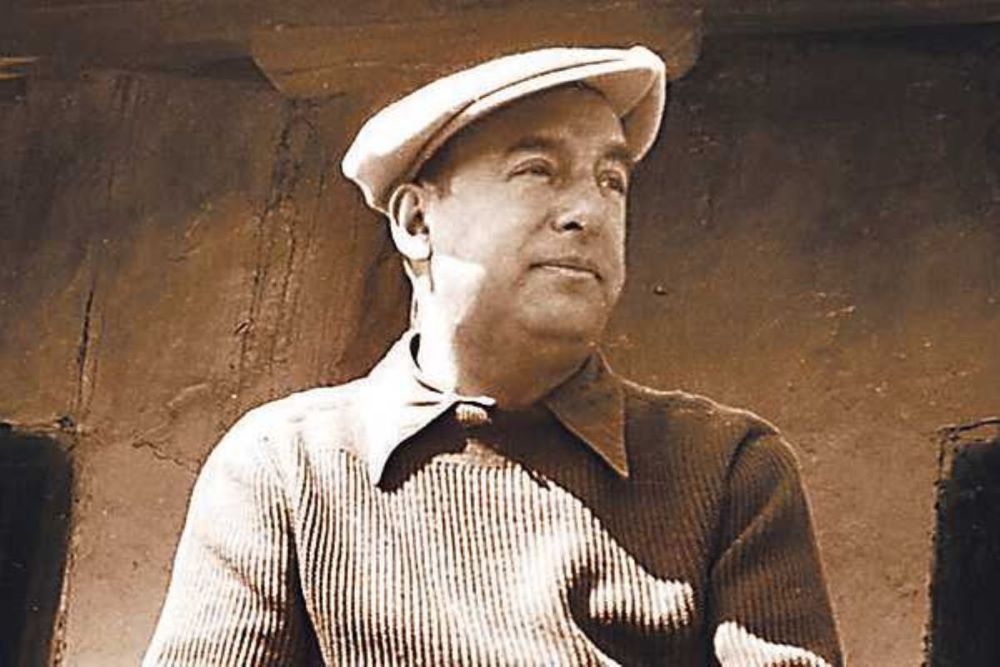
Neruda’s unwavering commitment to resistance and his artistic legacy serve as an enduring inspiration for those who seek to create a more just and equitable world
SHOUKAT LOHAR
Pablo Neruda, the renowned Chilean poet and political activist, left an indelible mark on both the literary world and the political landscape of Chile. His life and works were deeply intertwined with the tumultuous politics of his country, and he utilized his poetry as a powerful tool to express his resistance against social injustice, oppression, and political tyranny. Let’s explore thin threads of this silken poet – the life and works of Pablo Neruda, shedding light on his significant contributions to Chilean politics and his unwavering struggle for justice through the medium of literature.
Early Life and Political Awakening
 Born as Neftalí Ricardo Reyes Basoalto in Parral, Chile, on July 12, 1904, Neruda’s passion for writing emerged at an early age. He adopted the pseudonym “Pablo Neruda” in honor of the Czech poet Jan Neruda. His political awakening came during his teenage years, as he witnessed the stark inequalities and injustices prevalent in Chilean society. Neruda’s exposure to the struggles of the working class and indigenous communities deeply influenced his poetry and political ideology.
Born as Neftalí Ricardo Reyes Basoalto in Parral, Chile, on July 12, 1904, Neruda’s passion for writing emerged at an early age. He adopted the pseudonym “Pablo Neruda” in honor of the Czech poet Jan Neruda. His political awakening came during his teenage years, as he witnessed the stark inequalities and injustices prevalent in Chilean society. Neruda’s exposure to the struggles of the working class and indigenous communities deeply influenced his poetry and political ideology.
Political Engagement
Neruda became an active member of the Chilean Communist Party in the 1930s, and his political convictions became a prominent theme in his poetry. He served as a senator and diplomat, representing his country across the world and engaging in political discussions. However, his unwavering commitment to social justice often brought him into conflict with the ruling authorities.
Struggle and Resistance through Literature
Neruda’s poetry became a powerful medium for expressing his resistance against political oppression and social inequality. His works, such as “Canto General” and “Residence on Earth,” vividly portrayed the struggles of the marginalized and oppressed, offering a voice to the voiceless. Through his poems, Neruda denounced the abuses of power, violence, and exploitation, while advocating for the rights of the working class and indigenous communities.
Exile and Return
Following the military coup led by General Augusto Pinochet in 1973, Neruda faced persecution and was forced into exile. He spent his final years in various countries, including Argentina and Mexico, continuing his fight against the dictatorship from abroad. Neruda’s poetry during this period reflected his anguish, exile, and longing for his homeland.
Legacy and Impact
Pablo Neruda’s impact on Chilean politics and literature cannot be overstated. His commitment to justice, human rights, and social equality made him a symbol of resistance against oppression. Neruda’s poetry continues to inspire generations, transcending geographical and cultural boundaries. His works are a testament to the power of art and literature as agents of change and vehicles for political transformation.
Conclusion
Pablo Neruda’s life and works embody the inseparable relationship between art and politics. Through his poetry, he courageously confronted social injustices and political tyranny, becoming a voice for the marginalized and oppressed. Neruda’s unwavering commitment to resistance and his artistic legacy serve as an enduring inspiration for those who seek to create a more just and equitable world.
_______________
Shoukat Lohar is Assistant professor in English at Mehran University of Engineering and Technology Jamshoro. He can be reached at Shoukat.ali@faculty.muet.edu.pk